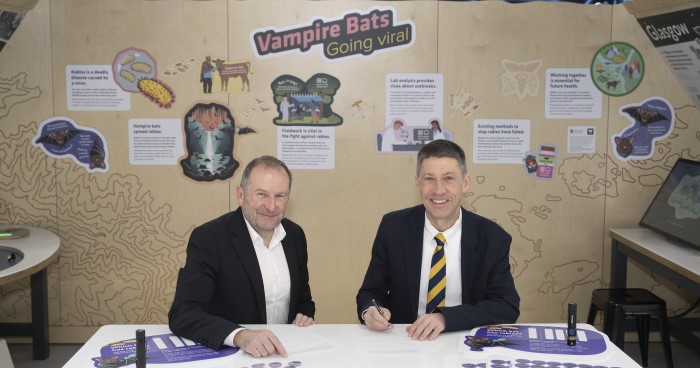UofG partners with Glasgow Science Centre to boost science engagement
Published: 22 April 2024
Memorandum of Understanding will create opportunities to promote science within the city.
The University of Glasgow has signed a Memorandum of Understanding (MOU) with Glasgow Science Centre which will help promote public engagement with science.
The MOU was signed on Thursday 18 April 2024 by David Duncan, Chief Operating Officer and Vice-Principal (Operations) of the University of Glasgow, and Dr Stephen Breslin, Chief Executive of Glasgow Science Centre.

The agreement will increase opportunities to promote science within communities across the city, engaging audiences with academic research, and the people who make it happen.
The MOU will facilitate greater coordination of existing public engagement programmes, while increasing collaborations with external partners and access to audiences across Glasgow.
It will enable public-facing programmes of work, such as Amplify, a competition for researchers within the University’s College of Medical, Veterinary and Life Science (MVLS), which tasks researchers with producing a public-facing exhibit related to their academic area.
The winner of the first phase of the Amplify project was showcased at the MOU signing event. ‘Bat Viruses: Behind the Scenes’ is an exhibition which will run in Glasgow Science Centre, investigating viruses carried by bats which can infect human, such as rabies, with the aim of developing more effective interventions.
Dr David Duncan, Chief Operating Officer for the University of Glasgow, said: “This is an exciting programme for the University of Glasgow - the Memorandum of Understanding will unlock new opportunities to increase the visibility and public understanding of science research.
“We very much look forward to working with all our partners to enhance the visibility of scientific research across the city. The collaboration will draw on the University’s track record of world-changing research and the long-standing expertise of Glasgow Science Centre in developing public engagement opportunities.”
Dr Meghan Griffiths, Research Assistant at the University of Glasgow and lead of the ‘Bat Viruses: Behind the Scenes’ project, said: “Science should be open and available and our aim was to demystify the scientific process and show how research on the diseases of wildlife is carried out.
“The Amplify programme looks at how we keep ourselves safe and work respectfully with our study species and with local communities. A major part of the exhibit is displaying the broad range of skills that one might use as a wildlife disease scientist, from fieldwork and laboratory skills to computational data analysis.
“Alongside a team of PhD students and post-docs from the University Colleg of Medical, Veterinary and Life Sciences, I worked with the Glasgow Science Centre design team to produce a permanent interactive exhibition showing visitors what life as a bat researcher can be like. I hope this work helps to inspire the next generation of scientists in the future.”
Dr Stephen Breslin, Chief Executive Officer at Glasgow Science Centre, said: “We have worked with the University of Glasgow for many years, and we are delighted that our relationship has been strengthened with this commitment to ongoing collaboration between our organisations.
“The Amplify project is a fantastic showcase of what we can achieve together. Glasgow Science Centre delivers unique public engagement opportunities, where we support academics and researchers with the interpretation of their important and often pioneering areas of research for our public and school visitors.
“Together we hope to encourage a wider interest in science and inspire many more young people to consider careers in STEM. We look forward to exploring more opportunities.”
First published: 22 April 2024
<< April

